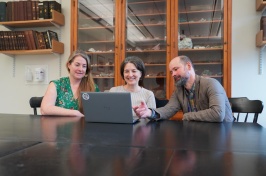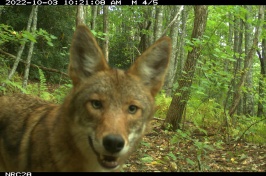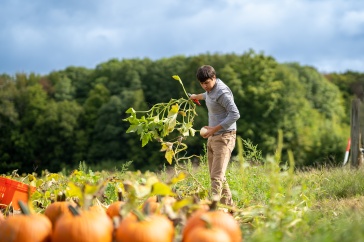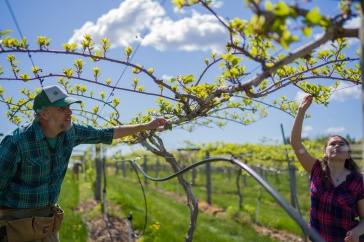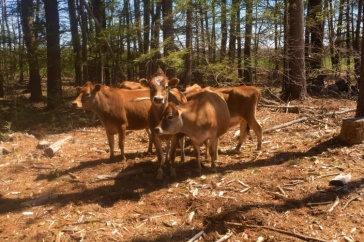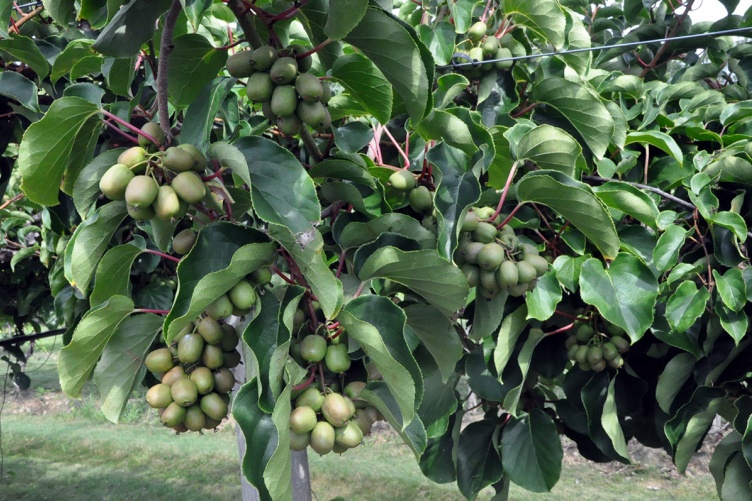
The Geneva 3 variety of kiwiberry, available from Hartmann's.

To try a kiwiberry — the sweet, smooth-skinned, grape-sized cousin to the familiar fuzzy kiwi — is to love a kiwiberry. Now, a new partnership between UNH and a commercial plant producer aims to ensure that every bite of a kiwiberry is as delicious as the next one, a level of product control essential to growing the commercial kiwiberry market.
UNH’s Kiwiberry Research and Breeding Program, a leader in kiwiberry breeding and the first team to genetically fingerprint all kiwiberry varieties in North America, has partnered with Hartmann's Plant Company of Lacota, Michigan, to genetically fingerprint the company’s kiwiberry inventory in an effort to verify the identity of varieties recommended for growing in New England.
It’s an important “under the hood” step toward moving kiwiberries from backyard gardens into commercial production, says Iago Hale, associate professor of specialty crop improvement and director of UNH’s kiwiberry program. Verification gives commercial growers, who may invest thousands of dollars and multiple acres into kiwiberry production, confidence to trust the identity of the kiwiberry varieties they’re planting.
Hale notes that unlike more familiar fruits, well established in our diets despite the occasional “bad apple” we might encounter, kiwiberries have one chance to win new fans. “To build a mature fruit sector, you need standards around market quality,” he says. “When you’re rolling out a new crop, there’s that moment when a potential consumer will taste the fruit for the first time. If the variety is wrong, if it’s not at peak ripeness, that person will simply conclude they don’t like kiwiberries, end of story.”
“Until this arrangement with Hartmann’s, we had growers who were willing to grow kiwiberries and we had consumers who wanted them. Now we have a reliable genetic source to make it happen.”
He adds that of the nearly 200 varieties of kiwiberries his team started with at the NH Agricultural Experiment Station’s Woodman Horticultural Research Farm, only a handful have proven themselves worthy of commercial production in the region. (Some, he says, are just awful. “We have one that tastes like grass and pickles and a pine tree had a baby.”)
Introduced to the U.S. from Asia in 1876, the kiwiberry (Actinidia arguta) has been grown as an ornamental vine in the Northeast for more than a century; Hale’s lab is leading the charge to bring the tropical taste complexity and nutritional superpowers of the kiwiberry to consumers. Hale estimates that the U.S. has between 200 and 300 acres total of commercial kiwiberry production, mostly concentrated in the Pacific Northwest; in New England, despite ideal growing conditions, “I’d be surprised if there are more than five acres.”
Hale worked with Hartmann’s, the only nursery offering kiwiberry vines at a volume and price targeted to commercial growers, to genetically analyze the company’s kiwiberry inventory and validate the identities of their offerings.
“These UNH-verified varieties will revolutionize the kiwiberry industry,” said Danny Hartmann, president of Hartmann’s Plant Company. “Thanks to the work by Dr. Hale, we are more confident in recommending varieties to growers and nurseries. We will continue to produce quality, true-to-name kiwiberries for the success of all of our customers.”
Working with UNHInnovation, Hartmann’s licensed the resulting data, which allows them to add a UNH-verified mark to their plants and produces income for the UNH kiwiberry research program. This is the first intellectual property license related to the kiwiberry program.
“As a leader in kiwiberry research, UNH is proud to play a part in increasing commercial interest in the fruit,” says Jenna Matheny, director of technology transfer for UNHInnovation, which manages the university’s intellectual property. “UNH has a long history as a land-grant university of using its world-class research and expertise to collaborate with industry and provide information and innovations that address ongoing agricultural challenges.”
“Until this arrangement with Hartmann’s, we had growers who were willing to grow kiwiberries and we had consumers who wanted them,” says Hale. “Now we have a reliable genetic source to make it happen.”
Nurseries interested in genetically certifying their kiwiberry plant material are encouraged to contact the UNH Kiwiberry Research and Breeding Program.
This material is based upon work supported by the NH Agricultural Experiment Station, through joint funding of the National Institute of Food and Agriculture, U.S. Department of Agriculture, under award numbers 233561 and 1006928, and the state of New Hampshire.
-
Written By:
Beth Potier | UNH Marketing | beth.potier@unh.edu | 2-1566






























